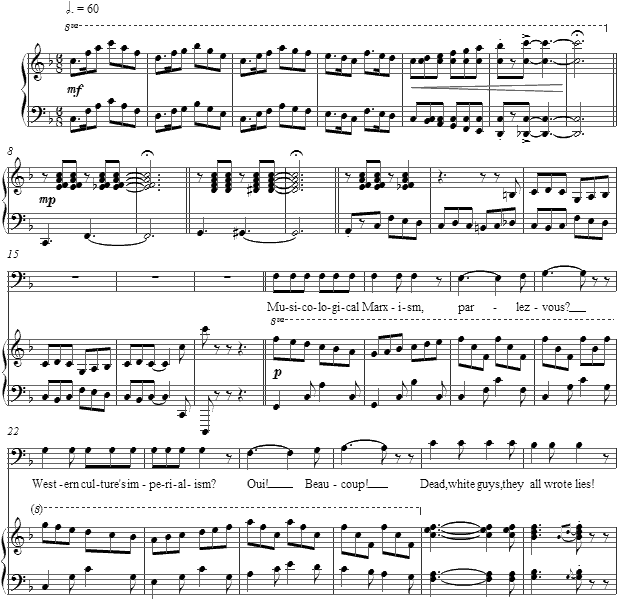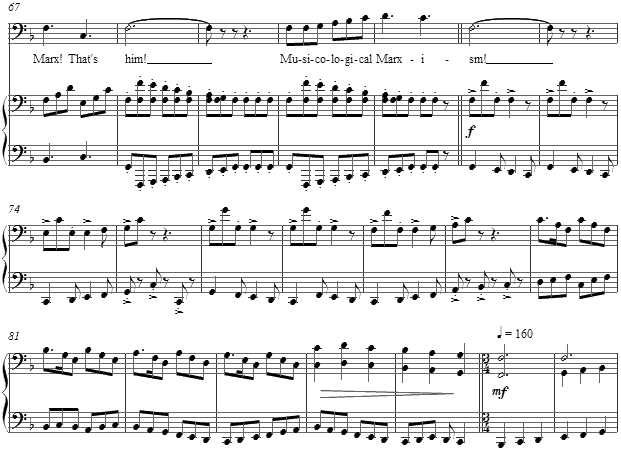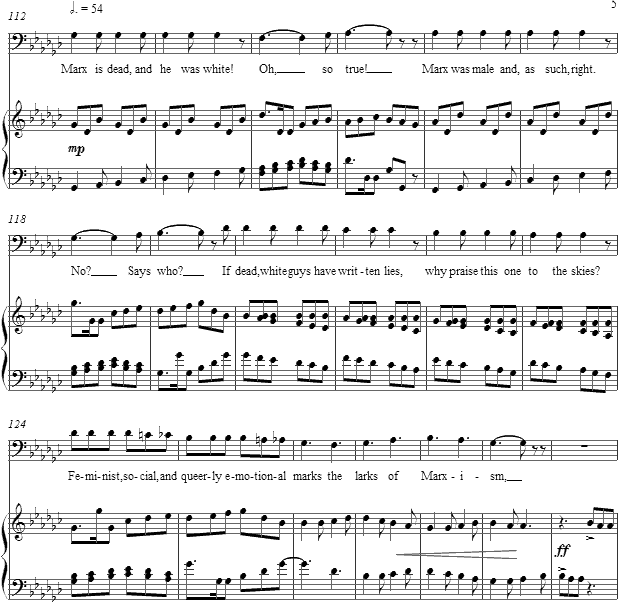Music and Texts of GARY BACHLUND
Vocal Music | Piano | Organ | Chamber Music | Orchestral | Articles and Commentary | Poems and Stories | Miscellany | FAQs
Musicological Marx - (2010)
Gary Bachlund
for baritone and piano
patter song variations on "Mademoiselle from Armentières"
Musicological Marxism, parlez-vous?
Western culture's imperialism? Oui! Beaucoup!
Dead white guys, they all wrote lies,
That's the truth, and it implies...
Musicological Marxism!
Anglo-American Marxism: qui êtes-vous?
Frankfurt had the finest school? Ja! It's true!
"Das Kapital's" a pretty tune;
Radical thinkers gush and swoon.
Musicological Marx! Their hymn!
Postmodern critical theory is parlayed too? Parlez-vous?
Culture's revision is made for you. Oui! Beaucoup!
Throw the past out, for its sins!
All's passé just like zeppelins!
Musicological Marx! That's him!
"Wer hat recht?" is incorrect. Parlez-vous?
"Was ist schön?" means disrespect! Ach! So true!
Beauty is no judge of things,
The coming revolution sings!
Musicological Marxism!
Marx is dead, and he was white! Oh, so true!
Marx was male and, as such, right. No? Says who?
If dead, white guys have written lies,
Why praise this one to the skies?
Feminist, social and queerly emotional
Marks the larks of Marxism!
Is music phallic, or just Gallic?
Is music gendered or have race?
Colonial music plays at conquest,
Imperious music's a disgrace.
Thumb your nose at loveliness? Mais, pourquoi?
"Kult der Häßlichkeit" is such la-di-dah!
Cheeky is as cheeky does,
In the blur of a blinding buzz -
Dick meant Richard -- Wagner or Strauß,
Now it's phallologocentrism's cross-dressing's blouse.
Musicological Marxism, parlez-vous?
Western culture's imperialism? Oui! Beaucoup!
Straight white guys (like Marx?) told lies,
That's the truth, and it implies...more
Musicological Marxism![ 8 pages, circa 4' 00" ]
Karl Marx
The impetus for this parody, variations on the World War I song "Mademoiselle from Armentières" wrapped with a poem about cultural Marxism as applied to musicology, came from reading some amusing blogs in which a syllabus of one set of class readings was more about an introduction to cultural Marxism itself, as to musicology in its larger scope and history.
The musical issues seemed more a premise on which to hang the instructor's obvious intellectual passion for Marx, probably as filtered through the lenses of Adorno, Gramsci and others, rather than on the weak statements of Marx about art per se. What was most amusing about accompanying commentary was the "blue" note of complaint from it and similar blogs that not enough positions for cultural Marxists were available in universities, much less other avenues of employment outside of academia.
This made me recall Frank Zappa's famous critique about Marxism/Communism in general, "Communism doesn't work because people like to own stuff."
Alas for the musicologist steeped in cultural Marxism and students he hoped to spawn, the market for employment in that particular industry seems dim at best. But such is life, when one backs away from surface tensions of the day for a larger overview of history and, for us, music history. One of the foundational thinkers in this folly was Marxist Georg Lukacs who asked in 1919, “Who will save us from Western Civilization?" Since civilization includes most of the Western musical canon, my answer is simple. I suspect no one will save "us," as they merely annoy us Westerners a bit with their evangelical fervor while trying. [ 1 ]
As to the tune on which these variations are based, it is sometimes called by its British refrain from early last century, "Hinky Dinky Parlay Voo," and is thought to come from the French in the 1830s, with subsequent revivals of it during the Franco-Prussian war of 1870, and then again in 1914, with a film based on it coming in 1926. A simple tune to remember, it can be infectious and these variations wrap with some other references to out Western musical canon. For more on the inane effects of Marxist thought about the production of art and control of artists towards the ends defined by the state, see the addenda included in my Collected Poetry / Volume III: Musicological Marx
- patter song variations on "Mademoiselle from Armentières"
The opening is neo-classic in gesture and design, leaning towards a music hall style as well. The two-voiced accompaniment to the vocal line is simple and tonal at the outset. Two strophes repeat the opening material with little more than octave displacement of the accompaniment.
A first large break from the continuing vocal line offers the piano a solo variation, punctuated and aggressive, but leading away from the 6/8 meter in order to set up the next strophe which comes in a l'istesso tempo 3/4 to the preceding meter.
Succeeding strophes now modulate to higher keys, and a major-mode snippet from Beethoven's 9th Symphony finds its way into the accompaniment, as at measure 114 and beyond. Another shift of tonality and meter and final return in a not quite "proper" recapitulation of the opening end the setting.
The score for Musicological Marx is available as a free PDF download, though any major commercial performance or recording of the work is prohibited without prior arrangement with the composer. Click on the graphic below for this piano-vocal score.
NOTES
[ 1 ] Some references in the text may be unfamiliar to those who have not studied Marx, cultural Marxism, and some history about the man and his devotees. After Marx, Adorno and Gramsci, the notion of cultural criticism itself has become synonymous with Marxism. Some contemporary cultural critics still consider themselves Marxist critics, being much the same thing to them. Not all music criticism can be labeled Marxist, for there are many other strains, many less focused on "saving" a people from Western civilization, as noted above.
The Frankfurt school of cultural Marxism (Institute for Social Research at the University of Frankfurt am Main) threw off writers and thinkers such as Antonio Gramsci and Georg Lukacs, with the stated purpose of overthrowing capitalist rule, which they saw as supporting a hegemonic Western culture.
Gramsci in particular was upset that the Socialist revolution failed to spread throughout Europe following the Russian Revolution in 1917. He reasoned that until there was found to "liberate" a people from Western culture as the underpinning of capitalism and alongside the economic in particular he sought liberation from their “Christian soul.”
Lukacs quote in mentioned above, “Who will save us from Western Civilization?” It is quite evangelical in its own way, we see, especially from the historical vantage point of twenty years after the economic collapse of the USSR, in what one Berlin placard called the "peaceful revolution."
How aghast a Gramsci or Lukacs might be today at this historical event.
The Centre for Contemporary Cultural Studies at the University of Birmingham, in the United Kingdom, is as much a player in the small resurgence of cultural Marxist theory -- under many names and most often dropping the adjective, Marxist. By the time one moves from the beginning of the 20th century to the beginning of the 21st century, a musicologist will declare of "new musicology," that "...there is no absolute music, that all music has sexual, political, personal and emotional programs." The notion that such a wide net might catch all possible angles for the angling musicologist is most amusing.
For this one must press for the "political" program of playing Bach's "Goldberg Variations."
What begins as a surrealism game of intellect -- A goes with B, if one can construct as rationale for it -- then certainly, the assertion is true in its way. It is also false in its way, for the impact of "Le Nozze di Figaro" is very different for today's audience than one of centuries ago, and yet the music and text remain the same throughout.
Therefore I argue that the perspective the audience brings is the issue, not the music itself. Can one bring a "sexual" question to an openly gay composer's work -- say, Britten's "Peter Grimes?" Perhaps, but the music and text of this opera do not change whether one does or does not consider Peter a child murderer or simply misunderstood member of an underclass. The multivalent story line and the readings as given by performers affect it, all the while the music itself remains the constant throughout.
A title such as “The Culture Industry: Enlightenment as Mass Deception” by Max Horkheimer and Theodor Adorno tell us quickly that there are a priori stances aplenty, as one is ready, willing and able to accuse with a phrase such as "mass deception," thereby positioning the authors as those who, not being deceived, can correct those of us who are so deceived.
In a similar way, one reads the political argument immediately in a title such as "Music, Domesticity, and Cultural Imperialism" of Richard Leppert.
Good for them, as they begin with a stance which declares culture to be "imperial" and/or "deception." And if one musical culture is so imperial, then is not the study of ethnomusicology merely in the same vein a study of other musical cultures imperial in their own ways? Becoming a devotee of one rather than another is a matter of associating with one "tribe" while rejecting another.
Such "criticism" quickly turns upon itself, for if culture is imperial, evangelical in its urge to convert and biased, is not then whatever cultural Marxism envisions as a better cultural, musical future also not imperial in its wish to conquer -- overthrow, in the sense of revolution -- one culture for the sake of a new, if as yet unknown culture?
I find another view much more cogent, in which cultures simply evolve, as more voices add to the expressions, dialects and sounds, senses and colorations, and this is growth of culture, such that a twelfth century French chivalric myth can become a nineteenth century opera and then a late twentieth century film. For such a long view, one needs only to occasionally employ the partially effective and sometimes wrongly chosen lens of cultural Marxism as only one of many lenses through which to view culture, and especially one's musical culture, in which each of us plays a small part at best.
In other words, pop musician Jim Morrison observed, "Each generation wants new symbols, new people, new names. They want to divorce themselves from their predecessors." How true for a rather mundane comment, when compared to the publications mounting up in musicological libraries.
What it comes to is this: musicology is conducted in words, mostly disassociated from the actual and ongoing music, while song texts, opera libretti and the like participate together with music in the music itself, and -- escaping words altogether -- music without words of many kinds and from many cultures entertains and affects us greatly. Which is specifically "imperial?" Or "political?"
What odd questions, by which to keep the many musicologists employed.
But such academic stances are colored for me by this quote: "The poor on the borderline of starvation live purposeful lives. To be engaged in a desperate struggle for food and shelter is to be wholly free from a sense of futility. The goals are concrete and immediate. Every meal is a fulfillment; to go to sleep on a full stomach is a triumph; and every windfall a miracle. What need could they have for ‘an inspiring super individual goal which could give meaning and dignity to their lives?’ They are immune to the appeal of a mass movement. There is perhaps no more reliable indicator of a society’s ripeness for a mass movement than the prevalence of unrelieved boredom. In almost all the descriptions of the periods preceding the rise of mass movements there is reference to vast ennui; and in their earliest stages mass movements are more likely to find sympathizers and support among the bored than among the exploited and oppressed." Eric Hoffer, in The True Believer.
Marxism was posited in its birth as "scientific socialism" and a proposed answer to the conditions of the poor and oppressed, then adapted by the Frankfurt and Birmingham schools as a basis for cultural criticism, and suggests that "purposeful lives" might respond to a revolution to assure food and shelter, but suggests to me that it will never create another revolution to uphold a particular kind of avant garde music over "imperial" music by "old dead white guys."
To conflate the two is to be just too "too revolutionary."
A deeper problem is that today, among those "dead white guys" are popular icons like George Gershwin, Richard Rodgers, Buddy Holly, John Lennon, the above-mentioned Jim Morrison, as well as the great classical music titans of twentieth century music -- Stravinsky and Schoenberg.



